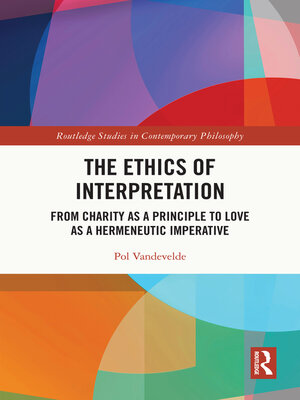The Ethics of Interpretation
ebook ∣ From Charity as a Principle to Love as a Hermeneutic Imperative · Routledge Studies in Contemporary Philosophy
By Pol Vandevelde

Sign up to save your library
With an OverDrive account, you can save your favorite libraries for at-a-glance information about availability. Find out more about OverDrive accounts.
Find this title in Libby, the library reading app by OverDrive.



Search for a digital library with this title
Title found at these libraries:
| Library Name | Distance |
|---|---|
| Loading... |
This book discusses the ethical dimension of the interpretation of texts and events. Its purpose is not to address the neutrality or ideological biases of interpreters, but rather to discuss the underlying issue of the intervention of interpreters into the process of interpretation.
The author calls this intervention the "ethical" aspect of interpretation and argues that interpreters are neither neutral nor necessarily activists. He examines three models of interpretation, all of which recognize the role that interpreters play in the process of interpretation. In these models, the question of the truth or validity of interpretation is dependent upon the attitude of interpreters. These three models are: (1) the principle of charity in interpretation in the two different versions defended by Hans-Georg Gadamer and Donald Davidson; (2) the production of truth, as developed by Paul Ricoeur and Michel Foucault; and (3) the regulative principle in interpretation as formal validity claims—as presented by Karl-Otto Apel and Jürgen Habermas—and as benevolence or love as an epistemic virtue—as defended by Friedrich Schlegel and Friedrich Schleiermacher. The critical discussion of these three models, which brings to the fore the different manners in which interpreters intervene in the process of interpretation as persons, lays the foundations for an ethics of interpretation.
The Ethics of Interpretation will be of interest to scholars and advanced students working in hermeneutics, 19th- and 20th-century philosophy, literary theory, and cultural theory.







